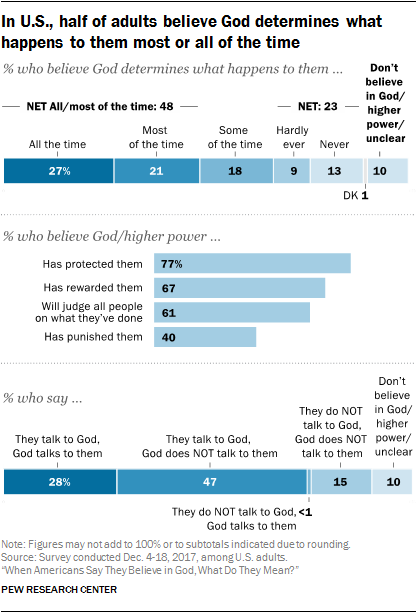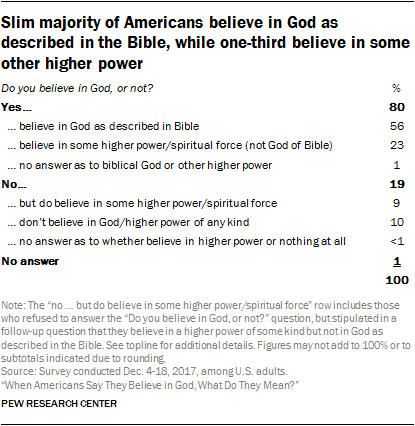Religion
Related: About this forumWhen Americans Say They Believe in God, What Do They Mean?
A new Pew Research Center survey of more than 4,700 U.S. adults finds that one-third of Americans say they do not believe in the God of the Bible, but that they do believe there is some other higher power or spiritual force in the universe. A slim majority of Americans (56%) say they believe in God “as described in the Bible.” And one-in-ten do not believe in any higher power or spiritual force.
In the U.S., belief in a deity is common even among the religiously unaffiliated – a group composed of those who identify themselves, religiously, as atheist, agnostic or “nothing in particular,” and sometimes referred to, collectively, as religious “nones.” Indeed, nearly three-quarters of religious “nones” (72%) believe in a higher power of some kind, even if not in God as described in the Bible.
The survey questions that mention the Bible do not specify any particular verses or translations, leaving that up to each respondent’s understanding. But it is clear from questions elsewhere in the survey that Americans who say they believe in God “as described in the Bible” generally envision an all-powerful, all-knowing, loving deity who determines most or all of what happens in their lives. By contrast, people who say they believe in a “higher power or spiritual force” – but not in God as described in the Bible – are much less likely to believe in a deity who is omnipotent, omniscient, benevolent and active in human affairs.
Overall, about half of Americans (48%) say that God or another higher power directly determines what happens in their lives all or most of the time. An additional 18% say God or some other higher power determines what happens to them “just some of the time.”
https://www.pewforum.org/2018/04/25/when-americans-say-they-believe-in-god-what-do-they-mean/


Xipe Totec
(44,063 posts)mr_lebowski
(33,643 posts)grumpyduck
(6,650 posts)when of course I couldn't ask at the risk of being instantaneously obliterated.
How do we know that everyone who believes in a Higher Power, regardless of what they call it, doesn't believe in the same Higher Power?
The Romans and the Greeks had different names for their chief gods. Were there really two separate chief gods? Meanwhile the Egyptians, about the same time, had Amun-Ra (correct me if I'm wrong) and the Israelites had theirs. Then somewhere along the line came the Biblical God.
So how do we now they aren't all the same entity, just called by different names?
customerserviceguy
(25,185 posts)they all have really different personalities.
Karadeniz
(23,420 posts)Holidays, the temples for prayer, rituals...some priests and priestesses performing charitable work, e.g. the temple of Diana in Ephesus took in orphans. To the masses this might be all they would ever know of the Other Side, sort of what the average Christian thinks religion is about and in the early Christian communities, this was the "children's" or beginners level...but those members knew they should progress beyond that.
"Philosophia" was the attempt to explain creation, the nature of spiritual beings, how man came about, etc. It often focussed on the values a human existence should aspire to. In Jesus's parables and in Paul, we find many levels of the Other Side and the different rulers are given human occupations(since they're in parable with earth as the setting), e.g. Father, owner, master, judge, jailer, etc. Paul calls this the adult level. This is virtually lost to most Christians today.
Antiquity also offered several mystery religions, such as for mithras which was a community and the primary alternative to Christianity. The Eleuthran mystery seems to have been a singular mystical experience of actually contacting or witnessing the spirit world...hard to know since it was kept secret for several centuries. Paul claims a mystery aspect to his religion and I find some evidence. The words that Paul says Jesus used at the last supper are almost verbatim to the sacrament ritual for Mithras. When Jesus casts demons into pigs who jump into water, that would be an image that almost everyone in the ancient world would recognize since that was a public part of the Eleuthran mystery.
Bottom line: There was a lot to the ancients' spiritual practices! BTW, the Hebrew scriptures portray more than one god. In Christianity, the athropomorphic God is for explanation only. The correct image used is light (energy)
For both God and the soul.
Bretton Garcia
(970 posts)Maybe all these gods are very different. Enough that to lump them together is misleading.
Sometimes it's hard to say.
Many "nones" might believe, say, in the partly determining role of Nature, physical causation, as described by science, say.
Is that a "higher power"?
It's an interesting, complicated subject.
Mariana
(15,112 posts)It's highly dishonest to pretend those terms are synonymous.